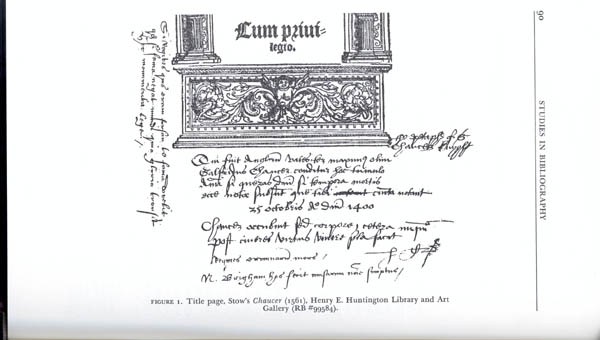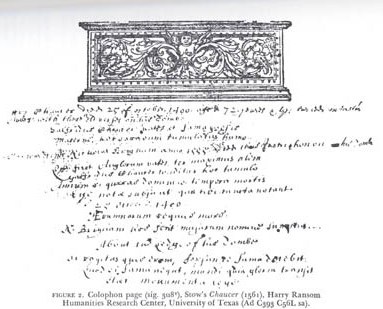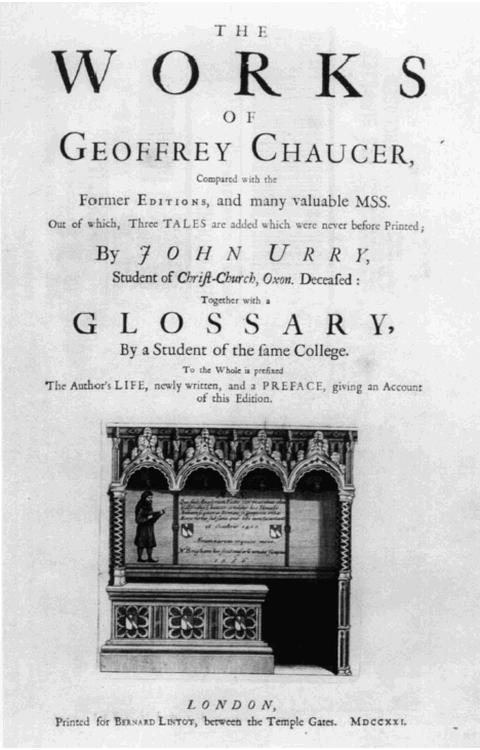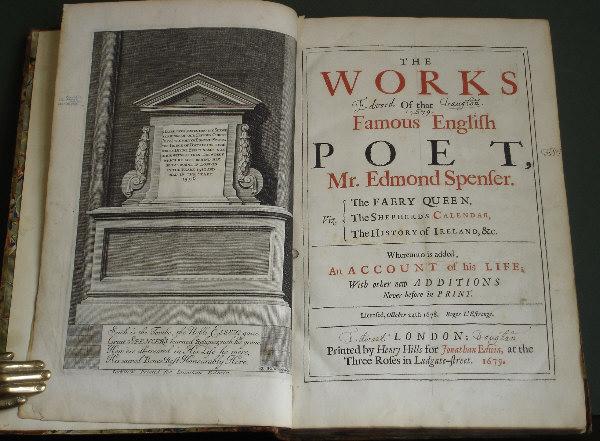
Kalamazoo 2010
Writing Fame: Manuscript Chaucer Epitaphs in Renaissance Editions of Chaucer's Collected Works
The last two photographs below are reproduced by permission of The John Work Garrett Library, Sheridan Libraries, The Johns Hopkins University. Clicking on these reduced images will take you to a full-size JPEG image.
1) 1994: Joseph A. Dane's epitaph discovery at the foot of the title page's printers ornament in a Kele 1550 edition at The Henry Huntington Library

2) 1994: Alexandra Gillespie's epitaph discovery on the colophon page of a 1561 Stow edition at the Harry T. Ransome Center Library (U. of Texas at Austin)

3) 2008: My first discovery of an epitaph MS below the colophon in a John Stowe 1561 Edition (JHU Catalog PO1850 1561a) [Collection of the Tudor and Stuart Club]
| Transcription of the Garrett Library "Tudor and Stuart Club" 1561 copy (rubrication imitates medieval manuscript style) | Joseph Dane & Alexandra Gillespie Transcription (Huntington and Ransome Center copies) |
|
Qui fuit Anglor<um> vates ter maximus, olim: Galfridus Chaucer, conditur hoc Tumulo Ann<um>, si queras domini: si tempora, Mortis: ecce: nota, subsunt: [que?] tibi cuncta, notant. Æ<um>mar<um> requies, Mors. N: B[ri?]gam: hos fecit [?musarum sumptus] 1556 |
Qui fuit Anglorum vates. Ter maximus olim Galfridus Chaucer. conditur hoc tumulo Annum si queras domini si tempora mortis ecce nota subsunt. que tibi cuncta notant. [ . . . ] <He who was once the thrice greatest English poet, Geoffrey Chaucer, is buried in this grave if you ask the year of the Lord, the period of his death, look at what is written below, which tells you all.> recquies erumnarum mors <The relief of all troubles is death. Nicholas Brigham assumed these
expenses in the name of the Muses. 1556 (tr. Dane)> |
4) My second epitaph MS at the end of Chaucer's works in a John Stowe 1561 Edition (JHU Catalog PO1850 1561) [Collection of John Work Garrett]
| Transcription of the Garrett Library "first" 1561 copy | Joseph Dane & Alexandra Gillespie Transcription (Huntington Library and Ransome Center copies) |
|
The wordes writtin a bout Chaucers tombe ſtone in Weſt<minster> Si rogites quis eram, forſan te fama docebit quod ſi fama negat, mundi quia gloria tranſit hec monumenta lege
written in West<minster> upon his tombe Qui fuit Anglon vates ter maximus olim Galfridis Chaucer conditur hoc tumulo An<n>um ſi queras d<omi>ni si tempora mortis ecce nota ſubſunt, qui tibi cuncta notant 25 octob<e>r a<n>o D<omi>ni 1400
Ærrumar<um> requies mors N: Brigham hos fecit musſar<um> <nomine> sumptus 1556 } wordis also writtin upon chaucers stone |
[The “verses about the ledge”] Si rogites quis eram forsan te fama docebit quod si fama negat mundi quia gloria transit Hec monumentie lege. Qui fuit Anglorum vates. Ter maximus olim |
5) Edmund Spenser (1596) on Chaucer's fame and works as a "monument" now "quite defaste" by time
6) Title page of the John Urry edition of The Works of Geoffrey Chaucer, London: Bernard Lintot, 1721. (Special Collections Oversize PR1850 1721)

7) Camden's text of Spenser's tomb epitaphs:
|
Hic prope Chaucerum situs est Spenserius, illi Proximus ingenio proximus ut tumulo. Hic prope Chaucerum, Spensere poeta, poetam Conderis, et versu quam tumulo propior. Anglica, te vivo, vixit plausitque poesis;
|
Here nigh to Chaucer Spenser lies; to whom In genius next he was, as now in tomb. Here nigh to Chaucer, Spenser, stands thy hearse, Still nearer standst thou to him in thy verse. Whilst thou didst live, lived English poetry; Now thou art dead, it fears that it shall die. (Tr. John Hales, "A Biography of Edmund Spenser," The Complete Works of Edmund Spenser (NY: Macmillan, |
8) Title page and frontispiece, Edmund Spenser, The Works of the Famous English Poet, Mr. Edmund Spenser . . . Whereupon is added, An Account of his Life, etc. London: Henry Hills for Jonathan Edwin, 1679 (first complete large folio edition with a "Life" and full apparatus).

(From a web-based image of a copy offered for sale by Peter Kennedy, Woking, Surrey, UK, 3/22/10)